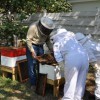Abstract
Keeping honey bees requires responsible management so that the bees do not become a nuisance. Additionally, the presence of Africanized honey bees in Florida places more pressure on beekeepers to maintain their colonies properly. This revised 3-page fact sheet is a reference for honey bee management in Florida, with emphasis on siting apiaries in sensitive locations, in order to promote harmonious cooperation between beekeepers, neighbors, and landowners. Written by Jamie Ellis and Jerry Hayes, and published by the UF Department of Entomology and Nematology, November 2014. (Photo by Thien Gretchen (CC BY-NC-ND 2.0), via Flickr)
References
James D. Ellis and Amanda Ellis. 2012. African honey bee, Africanized honey bee, killer bee, Apis melliferea scutellata Lepeletier (Insecta: Hymenoptera: Apidae). EENY 429. http://edis.ifas.ufl.edu/in790. https://doi.org/10.32473/edis-in916-2011
H. Glenn Hall, Catherine Zettel-Nalen, and James D. Ellis. 2014. African honey bee: what you need to know. ENY 114. http://edis.ifas.ufl.edu/mg113.
M. K. O'Malley, J. D. Ellis and A. S. Neal. 2012. Frequently asked questions about the Africanized honey bee in Florida. ENY 140. http://edis.ifas.ufl.edu/in738.
Florida Department of Agriculture and Consumer Services Division of Plant Industry. 2013. Best Management Requirements for Producing Honey Bee Queens in Florida. http://www.freshfromflorida.com/content/download/24006/486787/bmp_hbq.doc
Florida Department of Agriculture and Consumer Services Division of Plant Industry. 2013. Beekeeper Compliance Agreement-Best Management Requirements for Maintaining European Honey Bee Colonies. http://www.freshfromflorida.com/content/download/33027/812312/08492_sample_beekeeper_CA_for_EAB.pdf

